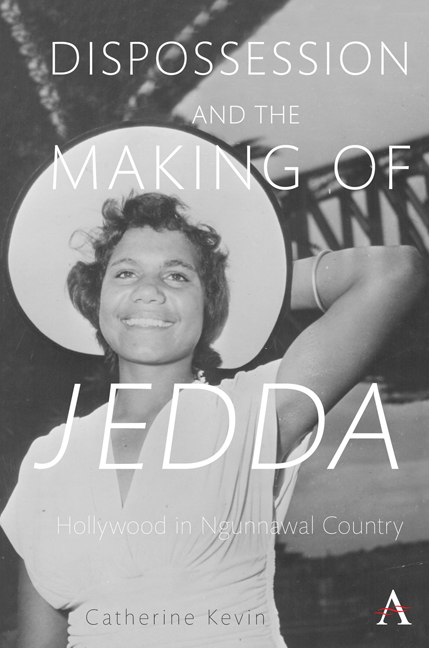Book contents
- Frontmatter
- Dedication
- Contents
- List of Figures
- Acknowledgements
- Introduction: Jedda (1955): Cultural Icon and Shared Artefact of Mid-Twentieth-Century Colonialism
- 1 Financing Jedda
- 2 Hollywood in the ‘Fine Wool Hub’
- 3 Making Jedda
- 4 Viewing Jedda
- Epilogue: Bogolong Memories and the Conceit of Family History
- Index
- Frontmatter
- Dedication
- Contents
- List of Figures
- Acknowledgements
- Introduction: Jedda (1955): Cultural Icon and Shared Artefact of Mid-Twentieth-Century Colonialism
- 1 Financing Jedda
- 2 Hollywood in the ‘Fine Wool Hub’
- 3 Making Jedda
- 4 Viewing Jedda
- Epilogue: Bogolong Memories and the Conceit of Family History
- Index
Summary
This chapter is about releasing, seeing and responding to Jedda. It is about the central players in this relocated story, how they were placed as they sat before the cinema screen and how this has been remembered over time, into the post-apology era. Cinema-going, like all public entertainments, has a social and political history. The segregation of town cinemas is an important part of this twentieth-century Australian history. I place viewing experiences in the context of the politics of the film's release in various places and the reviews it received that have shaped the conversations that have, in turn, inflected the memories of first watching Jedda. This film, redolent with meanings that have come into national historical consciousness in a much more reflexive way in recent decades, is considered here as a cultural product that has travelled through the twentieth century, in some periods left in the background, in others grabbed and held, studied closely as a conduit between past and present.
Jedda's Release and Distribution
The world premiere of Jedda was held at the Star Cinema in Darwin on 3 January 1955. Charles Chauvel understood Jedda as a most ambitious and risky film in its themes, visual scale and commitment to Indigenous actors in lead roles. Yet the early critical response to the film surely pleased the Chauvels. It celebrated their depiction of the Northern Territory and its Indigenous inhabitants. The Daily Mirror reported on the opening night, under the title ‘1000 Territorians at the Opening in Darwin’. It claimed that Jedda had ‘captured the imagination of Territorians who saw it last night. The film has succeeded for the first time in giving a good description of the world's oldest people – the aborigines – and the Northern Territory.’ The Advertiser informed its readers that
‘Jedda’ is expected to arouse great interest overseas as well as in Australia. For it is different from anything that has been shown on the world's screens. It shows the world's oldest race in one of the oldest countries where white man has only begun the process of civilization and development.
Although positive on the whole, the Advertiser noted some flaws in the acting.
- Type
- Chapter
- Information
- Dispossession and the Making of JeddaHollywood in Ngunnawal Country, pp. 81 - 104Publisher: Anthem PressPrint publication year: 2020



